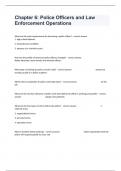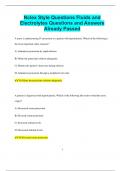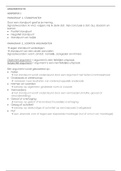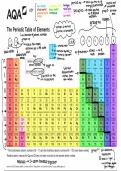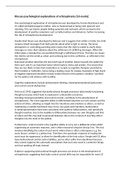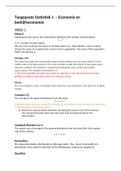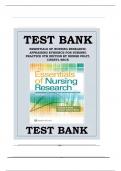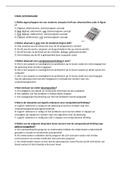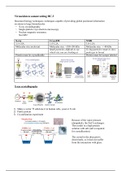Enforcement Operations
What are the main requirements for becoming a police officer? - correct answer
1. high school diploma
2. Good physical condition
3. absence of a criminal record
How has the profile of American police officers changed? - correct answer
Better educated, more female and minority officers
What type of training do police recruits need? - correct answer preservice
training usually in a police academy
Where does socialization to police work take place? - correct answer on the
job
What are the two key elements of police work that define the officer's working personality? - correct
answer danger and authority
What are the four types of stress felt by the police? - correct answer 1.
external stress
2. organizational stress
3. personal stress
4. operation stress
What is incident-driven policing? - correct answer citizen expectation that the
police will respond quickly to every call
, What is differential response? - correct answer policy that prioritizes calls
according to whether an immediate or delayed response is warranted
What are the basic measures of police productivity? - correct answer
clearance rate - the % of crimes know to the police that they believe they have solved through an arrest
- is the traditional productivity measure, now supplemented by such measurable activities as traffic
tickets n stop-n -frisk searches
What is the difference between line n staff functions? - correct answer
personnel assigned to line functions are directly involved in field operations; those assigned to stand
functions supplement n support the line function
What are the 3parts of patrol function? - correct answer 1. answering calls for
assistance
2. maintaining a police presence
3. probing suspicious circumstances
What is the job of the detective? - correct answer detectives examine the
crime scene, question witnesses and victims, and focus on gathering evidence to solve crimes
What are the four steps of the apprehension process? - correct answer 1.
detection of crime
2. preliminary investigation
3. follow-up investigation
4. clearance and arrest
What kinds of special operations units do police departments often employ? - correct answer
traffic, vice, narcotics, juvenile
What factors affect patrol assignments? - correct answer crime rates,
"problem neighborhoods," degree of urbanization, pressures from business people and community
groups, and socioeconomic conditions

